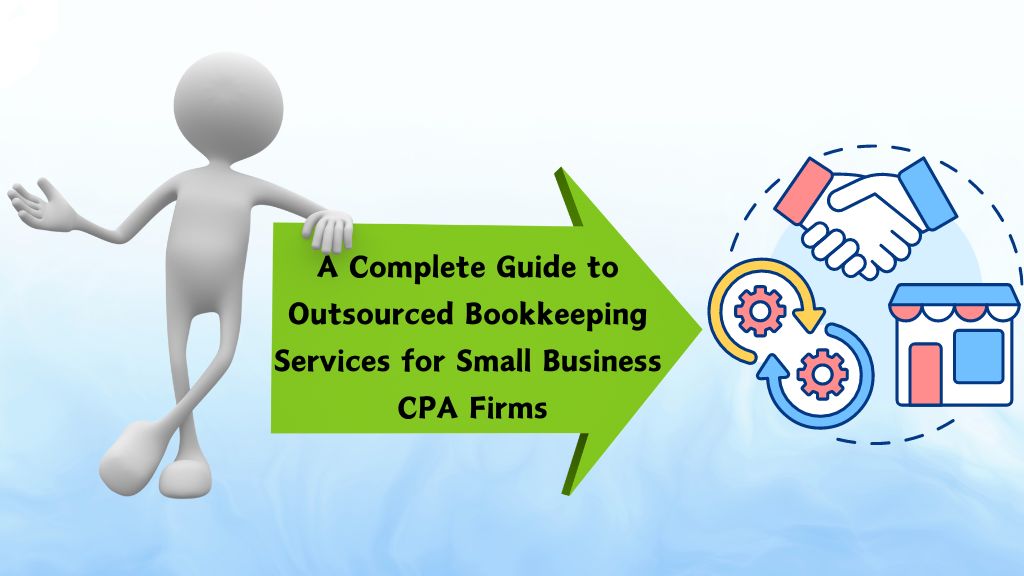Table of Content
- 1 What Is Outsourced Bookkeeping?
- 2 What Are the Benefits of Outsourced Bookkeeping for Small Businesses and CPA Firms?
- 3 What Services Are Included in Outsourced Bookkeeping?
- 4 How Do You Choose the Right Outsourced Bookkeeping Service for Your Small Business or CPA Firm?
- 5 What Are the Potential Risks of Outsourced Bookkeeping?
- 6 How Can You Ensure a Successful Outsourced Bookkeeping Relationship?
- 7 Frequently Asked Questions
- 7.1 How can outsourced bookkeeping services help my small business CPA firm to grow and acquire more clients?
- 7.2 What are the top reasons to consider outsourcing bookkeeping services for a progressive accounting firm?
- 7.3 How does outsourcing bookkeeping help with the day-to-day decisions of running a small or mid-sized business?
- 7.4 What are the different options for outsourced bookkeeping services for CPAs and which one is the best?
- 7.5 Why is it important for small business CPA firms to have a consistent team member responsible for managing a client’s books?
- 7.6 What are the benefits of outsourcing bookkeeping services for small business CPA firms?
In the dynamic world of small business Certified Public Accountant (CPA) firms, effective financial management is not just a necessity; it’s a cornerstone of success.
However, juggling the intricacies of bookkeeping alongside key operations can be a daunting challenge.
This article serves as your guide to understanding the pivotal role of outsourced bookkeeping services for small business CPA firms, shedding light on the myriad advantages and transformative potential of this strategic choice.
Outsourcing bookkeeping services has emerged as a game-changing strategy for small business CPA firms, enabling them to focus on delivering top-notch financial services to their clients while leaving the complexities of day-to-day bookkeeping in expert hands.
Join us as we explore the multifaceted benefits of this practice, including cost efficiency, access to specialized expertise, scalability, and the ability to drive growth.
Whether you are a small business CPA firm looking to enhance your efficiency or a business owner seeking expert financial services, this article equips you with the knowledge and insights to understand the profound impact of outsourced bookkeeping services—a strategic choice that empowers small business CPA firms to thrive in a competitive financial landscape.
Key Takeaways:
- Outsourcing bookkeeping can save your small business or CPA firm time and money while providing access to specialized expertise.
- Services such as accounts payable, accounts receivable, bank reconciliations, financial reporting, and payroll processing are typically included in outsourced bookkeeping.
- To choose the right outsourced bookkeeping service, consider your needs, research potential providers, discuss technology and security measures, read reviews, and discuss pricing and contracts.
What Is Outsourced Bookkeeping?
Outsourced bookkeeping is the process of hiring an external company or individual to manage a business’s financial recording and reporting tasks.
This means that the bookkeeping responsibilities are entrusted to a third party, such as a CPA firm, instead of being handled by an in-house bookkeeper. This arrangement offers various advantages, such as:
- Cost savings
- Access to expert knowledge and technology
- More time for business owners to focus on core operations
By utilizing outsourced bookkeeping, small businesses can have accurate financial records, timely reporting, and valuable financial insights, allowing them to make informed decisions and stay compliant with regulations.
What Are the Benefits of Outsourced Bookkeeping for Small Businesses and CPA Firms?
As a small business or CPA firm, bookkeeping can be a time-consuming and tedious task. However, outsourcing this responsibility can offer numerous benefits that can greatly improve the efficiency and success of your business.
In this section, we will discuss the various advantages of outsourcing bookkeeping, including cost and time savings, access to expertise, and scalability. By the end, you will understand why many businesses and firms are turning to outsourced bookkeeping services for their financial management needs.
1. Cost Savings
Outsourced bookkeeping is a great option for small businesses and CPA firms looking to save on costs. Here are the steps to achieve these savings:
- Reduced labor costs: By outsourcing, businesses can eliminate the need to hire and train in-house bookkeepers, resulting in significant savings on salaries and benefits.
- Lower infrastructure expenses: Outsourcing can also help businesses avoid the costs associated with purchasing and maintaining bookkeeping software and equipment.
- No overhead costs: With outsourced bookkeeping services operating remotely, businesses can save on office space and utility expenses.
- Access to specialized expertise: Outsourcing enables businesses to access the knowledge and skills of experienced bookkeeping professionals without the added expense of hiring full-time staff.
- Scalability: Outsourced services can easily adapt to changing business needs, providing businesses with the flexibility to scale up or down without incurring the costs of hiring or firing employees.
2. Time Savings
Outsourcing bookkeeping can save small businesses and CPA firms valuable time. Here are steps to achieve time savings through outsourced bookkeeping:
- Streamline Processes: Work with the service provider to optimize bookkeeping workflows and eliminate inefficiencies.
- Automate Tasks: Take advantage of technology solutions offered by the provider to automate data entry, reconciliation, and reporting.
- Access Real-Time Information: By outsourcing, businesses can have immediate access to up-to-date financial data without spending time manually updating records.
- Focus on Core Competencies: With bookkeeping taken care of, business owners and accountants can dedicate more time to strategic planning and client relationships.
- Reduce Administrative Burden: Outsourcing eliminates the need to hire, train, and manage an in-house bookkeeping team, saving time on recruitment and supervision.
3. Access to Expertise
Access to expertise is a significant benefit of utilizing outsourced bookkeeping services for small businesses and CPA firms. To fully maximize this advantage, it is important to follow these steps:
- Identify specific areas where expertise is required, such as tax compliance or financial reporting.
- Conduct thorough research to find potential outsourced bookkeeping providers with extensive experience and expertise in those identified areas.
- Evaluate their qualifications, certifications, and years of industry experience to guarantee they meet your needs.
- Read client testimonials or case studies that highlight their expertise and success in providing outsourced bookkeeping services.
- Engage in consultation with potential providers to assess their understanding of your business needs and their ability to offer expert guidance.
Fact: Outsourced bookkeeping services can provide access to expertise, resulting in more accurate financial reporting and better decision-making for small businesses and CPA firms.
4. Scalability
Outsourcing bookkeeping for small businesses and CPA firms offers significant scalability benefits. As the business grows, the outsourced bookkeeping service can easily handle increased transaction volume and financial complexity.
With their resources and expertise, they can manage the additional workload without the need for the business to hire and train new staff.
This scalability allows the business to prioritize pivotal operations and strategic objectives while ensuring the accuracy and timeliness of financial record-keeping.
Additionally, outsourcing bookkeeping provides businesses with the flexibility to adjust the level of service as needed, whether increasing or decreasing, resulting in cost efficiency.
What Services Are Included in Outsourced Bookkeeping?
As a small business owner or a CPA firm, managing bookkeeping tasks can be time-consuming and take away from other important aspects of running a business. That’s where outsourced bookkeeping services come in.
These services offer a range of tasks to help streamline and organize your financial records. In this section, we’ll explore the various services included in outsourced bookkeeping, such as accounts payable, accounts receivable, bank reconciliations, financial reporting, and payroll processing.
Each of these services plays a vital role in maintaining the financial health of a business.
1. Accounts Payable
Outsourced bookkeeping can streamline your small business or CPA firm’s financial processes. When it comes to managing accounts payable, follow these steps to guarantee effective management:
- Set up a system: Establish a clear process for receiving and recording invoices.
- Review and verify: Carefully check each invoice for accuracy and legitimacy.
- Record payments: Enter payment details into your accounting system promptly.
- Monitor due dates: Stay on top of payment deadlines to avoid late fees or penalties.
- Reconcile statements: Regularly compare your records with vendor statements to identify any discrepancies.
By outsourcing accounts payable tasks, you can save time and reduce errors while maintaining financial control.
2. Accounts Receivable
- Establish an organized system: Develop a process for invoicing customers and tracking payments for your accounts receivable.
- Issue invoices promptly: Send out invoices immediately after providing goods or services to ensure prompt payment.
- Clearly communicate payment terms: Clearly state the due date and any penalties or late fees for overdue payments to avoid confusion.
- Follow up on outstanding invoices: Consistently follow up with customers who have not paid to inquire about the status of their payment.
- Offer convenient payment options: Provide customers with various payment methods, such as online payments or credit card processing, for their accounts receivable.
To guarantee a smooth accounts receivable process, regular monitoring and diligent follow-up are crucial. Implementing a clear and efficient system can help maintain a healthy cash flow for your business.
3. Bank Reconciliations
Outsourced bookkeeping services often include bank reconciliations as part of their offerings. Bank reconciliations are crucial for ensuring the accuracy and integrity of financial records. Here are the steps involved in the bank reconciliation process:
- Gather bank statements: Collect the latest bank statements from your business account.
- Compare transactions: Match the transactions listed on the bank statement with the transactions recorded in your accounting system.
- Identify discrepancies: Look for any discrepancies or differences between the two sets of records.
- Investigate differences: Investigate any discrepancies by checking for errors, missing transactions, or unauthorized charges.
- Adjust records: Make any necessary adjustments in your accounting system to align it with the bank statement.
- Reconcile the balance: Ensure that the ending balance on the bank statement matches the ending balance in your accounting system.
- Document the reconciliation: Keep a record of the bank reconciliation process for future reference and auditing purposes.
By following these steps, businesses can maintain accurate financial records and detect any potential errors or fraudulent activities in their bank transactions.
4. Financial Reporting
Outsourced bookkeeping services offer essential financial reporting for small businesses and CPA firms. This includes producing precise financial statements, such as balance sheets and income statements, to gain insights into the company’s financial well-being.
Furthermore, financial reporting aids in making informed business decisions, monitoring performance, and analyzing patterns. Skilled professionals handle this responsibility, ensuring adherence to accounting standards and regulations.
By outsourcing financial reporting, businesses can concentrate on core activities while utilizing the expertise and efficiency of external bookkeeping experts. This streamlines operations, improves accuracy, and delivers prompt and dependable financial information.
5. Payroll Processing
Outsourcing payroll processing can offer numerous benefits for small businesses and CPA firms. To secure a successful partnership with an outsourced bookkeeping service for payroll processing, consider the following steps:
- Evaluate your payroll needs and determine which services are necessary for your business.
- Research potential providers and compare their expertise and experience in payroll processing.
- Consider the technology and security measures implemented by the providers to protect sensitive payroll data.
- Read reviews and ask for references to assess the reputation and dependability of the outsourced bookkeeping service.
- Discuss pricing and contract terms to make sure they align with your budget and business requirements.
By following these steps, you can select the ideal outsourced bookkeeping service for payroll processing and streamline your business operations.
How Do You Choose the Right Outsourced Bookkeeping Service for Your Small Business or CPA Firm?
Outsourcing your bookkeeping can be a smart decision for small businesses or CPA firms looking to streamline their financial processes and focus on their revenue-generating operations.
However, with so many options for outsourced bookkeeping services, how do you choose the right one for your specific needs?
In this section, we’ll cover the key factors to consider when selecting an outsourced bookkeeping service, including determining your needs, researching potential providers, evaluating their technology and security measures, reading reviews and asking for references, and discussing pricing and contracts.
1. Determine Your Needs
When selecting an outsourced bookkeeping service for your small business or CPA firm, it’s important to establish your needs to assure the best fit. Follow these steps to help determine your needs:
- Evaluate your current bookkeeping processes and identify any pain points or areas for improvement.
- Take into account the complexity of your financial transactions and reporting requirements.
- Assess your budget and decide on the amount you are willing to invest in bookkeeping services.
- Identify any specific industry or regulatory compliance requirements that your bookkeeping service must meet.
- Consider the level of support and communication you require from your bookkeeping service provider.
2. Research Potential Providers
Researching potential providers is a crucial step in choosing the right outsourced bookkeeping service for small businesses or CPA firms. Here are the steps to follow:
- Identify your specific bookkeeping needs and requirements.
- Gather a list of potential providers through online research, recommendations, or industry associations.
- Review their websites and online presence to assess their expertise, experience, and range of services.
- Consider their technology and security measures, ensuring they use secure systems and have measures in place to protect your data.
- Read customer reviews and ask for references to gauge their reputation and client satisfaction.
- Discuss pricing and contracts, ensuring their services align with your budget and preferred payment terms.
True Story: A small CPA firm followed these steps and found a reputable outsourced bookkeeping service provider like Prime Offshore Accounting that saved them time and provided accurate financial reporting, allowing them to focus on their core business activities and serve their clients more effectively.
3. Consider Their Technology and Security Measures
When selecting an outsourced bookkeeping service, it is essential to consider their technology and security measures. Here are the steps to evaluate their capabilities and ensure the protection of your data:
- Assess their software: Look for service providers that use modern, secure accounting software with features like encryption and multi-factor authentication.
- Review data storage: Inquire about their data storage practices, such as cloud-based solutions with robust security protocols and regular backups.
- Evaluate data access: Determine who will have access to your financial data and make sure that confidentiality agreements are in place.
- Consider cybersecurity measures: Ask about their cybersecurity practices, such as regular vulnerability assessments, firewalls, and intrusion detection systems.
- Request information on employee training: Inquire about their staff’s training on data security and privacy to make sure they understand and adhere to best practices.
By following these steps, you can choose an outsourced bookkeeping service that prioritizes technology and security, safeguarding your financial information.
4. Read Reviews and Ask for References
When selecting an outsourced bookkeeping service, it is essential to thoroughly research and gather information to assure its reliability and quality.
- Begin by conducting online research and reading reviews and testimonials from other businesses that have utilized the service.
- Reach out to your professional network and seek recommendations or references for trustworthy bookkeeping services.
- Contact potential providers and request references from their current or previous clients.
- Reach out to these references and inquire about their experience with the service, including their satisfaction with accuracy, timeliness, and communication.
- Take into account the reputation of the service provider based on the reviews and references gathered before making a decision.
Fact: According to a survey, 90% of consumers read online reviews before making a purchase decision.
5. Discuss Pricing and Contracts
When it comes to pricing and contracts for outsourced bookkeeping services, it is foremost to follow these steps for a successful arrangement:
- Assess your budget and financial needs to determine what you can afford.
- Research potential providers and compare their pricing structures.
- Consider the services included in each package and whether they align with your requirements.
- Discuss pricing options with providers, including any additional fees or charges.
- Clarify contract terms, such as the length of the agreement and any cancellation policies.
By carefully discussing pricing and contracts, you can find an outsourced bookkeeping service that fits within your budget and secures a beneficial partnership.
What Are the Potential Risks of Outsourced Bookkeeping?
While outsourcing bookkeeping services can be a cost-effective solution for small business CPA firms, it’s vital to be aware of the potential risks involved.
In this section, we will discuss the potential risks that come with outsourcing bookkeeping. From data security breaches to communication issues and lack of control, it’s important to understand these risks in order to make an informed decision for your business.
Let’s take a closer look at each of these risks and how they can impact your business.
1. Data Security Breaches
Outsourcing bookkeeping can offer numerous benefits to small businesses and CPA firms, but it also comes with potential risks. One significant risk is the occurrence of data security breaches.
To mitigate this risk and make sure the safety of your sensitive financial information, consider the following steps:
- Choose a reputable and trustworthy outsourced bookkeeping service provider with a proven track record of maintaining data security.
- Ensure that the provider has robust security measures in place, such as encryption, firewalls, and secure servers, to protect your data.
- Implement strong password policies and access controls to limit who can access your financial data.
- Regularly monitor and audit the provider’s security protocols to identify any vulnerabilities or potential breaches.
- Establish clear communication channels with the provider to promptly address any security concerns that may arise.
By taking these steps, you can minimize the risk of data security breaches and maintain the confidentiality of your financial information.
2. Communication Issues
- Establish clear communication channels with your outsourced bookkeeping service provider to avoid any potential communication issues.
- Define expectations and preferred modes of communication, such as email, phone calls, or virtual meetings, to assure effective communication.
- Regularly schedule check-ins to discuss any concerns, updates, or questions and address any potential communication issues.
- Provide detailed instructions and documentation to assure accurate and timely communication between you and your outsourced bookkeeping service provider.
- Clarify response times and turnaround expectations for inquiries or requests to avoid any potential communication issues.
Fact: Effective communication is crucial for a successful outsourced bookkeeping relationship, reducing misunderstandings and maximizing efficiency.
3. Lack of Control
Lack of control is a potential risk of outsourced bookkeeping. To mitigate this risk, follow these steps:
- Establish clear communication channels with the bookkeeping service provider.
- Define your expectations and requirements upfront.
- Regularly review and monitor the bookkeeping processes and reports to maintain control.
- Implement checks and balances to guarantee accuracy and prevent errors or fraud.
- Retain access to your financial records and make sure backups are maintained for added control.
By following these steps, you can maintain a sense of control over your financial records while benefiting from outsourced bookkeeping services.
How Can You Ensure a Successful Outsourced Bookkeeping Relationship?
Successfully outsourcing bookkeeping services for your small business CPA firm requires careful consideration and proactive management. Here are some steps for a successful outsourced bookkeeping relationship:
- Define your expectations: Clearly communicate your requirements, deadlines, and quality standards to the outsourcing partner.
- Select a reliable partner: Choose a reputable firm with experience in providing bookkeeping services for CPA firms and positive client testimonials.
- Establish communication channels: Set up regular meetings and maintain open lines of communication to promptly address any issues or concerns.
- Provide access to necessary information: Ensure that the outsourcing partner has access to all relevant financial data and software systems.
- Monitor performance: Regularly review the accuracy and timeliness of the outsourced bookkeeping work to maintain high-quality standards.
- Address issues proactively: If any problems arise, address them promptly and work together to find solutions.
- Evaluate and adjust: Regularly assess the effectiveness of the outsourcing relationship and make necessary adjustments to optimize efficiency and quality.
Frequently Asked Questions
How can outsourced bookkeeping services help my small business CPA firm to grow and acquire more clients?
Outsourced bookkeeping services can help your small business CPA firm to streamline your practice and focus on strategic decisions. By delegating time-intensive tasks to a reliable company, you can invest resources in acquiring more clients and providing better services.
This not only leads to a higher profit margin but also uplifts your market presence and helps you to stay ahead in the competitive B2B SAAS industry.
What are the top reasons to consider outsourcing bookkeeping services for a progressive accounting firm?
Some of the top reasons to consider outsourcing bookkeeping services for a progressive accounting firm are: managing cash flow more effectively, acquiring a deeper knowledge of your client’s unique financial information procedures, getting strategic insights for better decision-making, and managing the shifting demand for accounting services with the help of a dedicated team.
How does outsourcing bookkeeping help with the day-to-day decisions of running a small or mid-sized business?
Outsourcing bookkeeping services can provide you with intimate knowledge of your client’s books, enabling you to make better and more informed day-to-day decisions. With regular discussions and financial review meetings, you can stay on top of your client’s financial situation and provide valuable advice for their business.
What are the different options for outsourced bookkeeping services for CPAs and which one is the best?
There are 7 different options for outsourced bookkeeping services for CPAs, including offshoring, outsourcing, onshoring, TOA Global, and more.
The best option depends on your specific needs and goals, but TOA Global, with its 9 different offices, 500 accounting firm clients, and 1,600 experienced bookkeepers, is considered one of the best in class technology and services for outsourced bookkeeping.
Why is it important for small business CPA firms to have a consistent team member responsible for managing a client’s books?
Having a consistent team member responsible for managing a client’s books can increase efficiency and save time in the long run. This team member becomes familiar with the client’s unique needs and can provide better services over time.
It also reduces the stress of constantly training new team members and ensures a solid foundation for managing the client’s finances.
What are the benefits of outsourcing bookkeeping services for small business CPA firms?
Some of the benefits of outsourcing bookkeeping services for small business CPA firms include financial relief, access to a pool of talented and knowledgeable accountants, the ability to focus on other aspects of the accounting life cycle, and cost savings due to lower labor cost structures.
It also allows you to use modern accounting software and keep up with industry trends without investing in buying licenses or training sessions.








